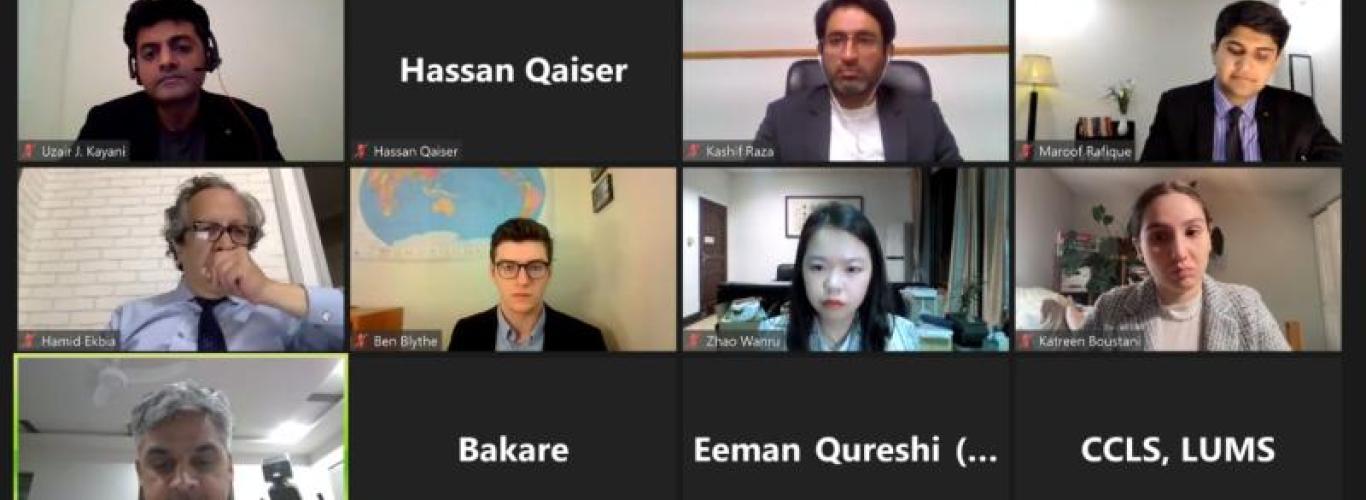CCLS Arranges an International Virtual Conference
On Friday, 1st April 2022, the Centre for Chinese Legal Studies (CCLS) at Shaikh Ahmad Hassan School of Law (SAHSOL), LUMS hosted an international virtual conference on Regional, Economic and Political Dimensions of the China-Pakistan Economic Corridor and the Belt and Road Initiative and invited speakers from around the world to participate. Professor Uzair Kayani, Head of the Department at SAHSOL, delivered the welcome note, while Professor Sikander A. Shah (Director CCLS) gave an outline of the Centre’s work along with a snapshot of CPEC progress.
Dr. Nadeem-ul-Haque, Vice Chancellor of Pakistan Institute of Development Economics Islamabad joined the session as the keynote speaker. The speakers’ panel was graced by Ms. Zhao Wanru from Wuhan University, Mr. Maroof Rafique (Associate at the Chartered Institute of Arbitrators and a Digital Justice Advocate in Pakistan), Dr. Najimdeen Bakare (Associate Professor at the Centre for International Peace and Stability at the National University of Science and Technology - Islamabad), Dr. Hamid Ekbia from Indiana University and his team including Mr. Benjamin Blythe and Ms. Katreen Boustani, and Mr. Kashif Raza from the University of Calgary.
Dr. Nadeem-ul-Haque delivered the keynote address where he offered a critical overview of the institutional framework with respect to Special Economic Zones (SEZs) and the mediocre socioeconomic outcomes in Pakistan. A particularly notable reform he suggested is to build “industrial towns” integrated with SEZs, yielding greater efficiency and a stronger social structure.
Professor Zhao Wanru presented her paper on cross-border data flow with respect to the emergence of the digital silk road. She emphasized that localized data governance policies in different legal systems are unfavorable for cooperation. She favored a global governance framework and offered proposals discussing EU and US models for data flow.
On a related note, Mr. Maroof Rafique talked about the judicial transformation of Pakistan in terms of data and technology through various forms of e-justice. He stated that this transformation will create an effective judicial system that incentivizes domestic and foreign players, especially with respect to CPEC, to invest in the Pakistani economy, while also promoting equitable judicial access.
Dr. Najimdeen Bakare, who works primarily in the areas of EU, African and global politics, and matters of diaspora and minorities, highlighted the distinctive aspects of China’s need driven world order and its economic foreign policy, which has focused on infrastructure development.
Dr. Hamid Ekbia and his team, whose research focuses on the political economy of modern technology, the dynamics of digital/anti-digital infrastructures and economic development, spoke at length about a move towards geoeconomics, including the sharing of a case study about the global cotton trade comparing its colonial context with the current situation in relation to CPEC.
Mr. Kashif Raza, who specializes in matters of language policy and development, talked about linguistic challenges in the operationalization of CPEC, pointing out that the current policies enable the hegemony of foreign languages, especially Mandarin. He proposed a multi-lingual economic policy for CPEC entailing both foreign and local languages.
Upon conclusion of the presentations, Professor Kayani opened the floor to questions. Topics discussed included the potential misuse of data as sharing proliferates and the pros and cons of the free trade agreements between China and Pakistan. Ultimately, the conference successfully highlighted the practical challenges faced by the Pakistani economy and society and introduced novel perspectives, as well as proposals, for stronger China-Pakistan collaboration in all domains.

